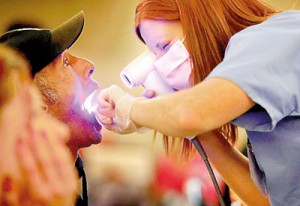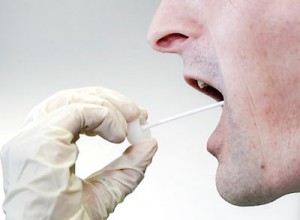Sunday Times 2
Saliva test for cancer hailed as holy grail for early detection
A simple saliva test has been hailed as the holy grail in the early detection of deadly diseases such as cancer.

A doctor in the US runs an oral cancer scan on a patient. Many of the molecules visible in cancer patients' blood could be identified in saliva, researchers discovered (AFP)
It could also apply to dementia, Alzheimer’s, type 2 diabetes and auto-immune diseases, the researchers said.
The study, the most comprehensive analysis ever conducted of a particular type of molecules in human saliva, reveals that saliva contains many of the same disease-revealing molecules that are in blood.
Dentists may soon be able to take saliva samples to analyse for disease.
The report’s lead author Dr David Wong, a dental expert at the University of California in Los Angeles, said the research could lead to self-diagnostic devices.
‘If we can define the boundaries of molecular targets in saliva, then we can ask what the constituents in saliva are that can mark someone who has pre-diabetes or the early stages of oral cancer or pancreatic cancer – and we can utilise this knowledge for personalised

A simple saliva test could be the best new way to test for early signs of cancer and other diseases, researchers have claimed (Reuters)
medicine.
‘If you don’t look in saliva, you may miss important indicators of disease. There seems to be treasure in saliva, which will surprise people.
‘This could indicate that wearable gear that informs you whether you have a disease – even before you have any symptoms – is almost here,’ he said.
Dr Wong’s laboratory discovered that some of the same RNA that is inside human cells are also present in saliva and can be used to detect diseases – a surprising finding, he said, because enzymes in saliva can degrade RNA, making the mouth “a hostile environment.
The new research involved analysing 165 million genetic sequences, details of which are published in the scientific journal Clinical Chemistry.
© Daily Mail, London

